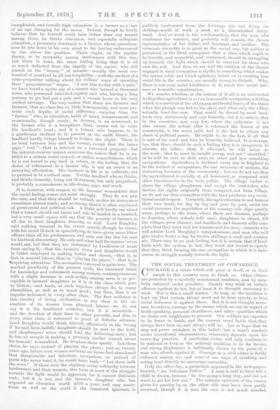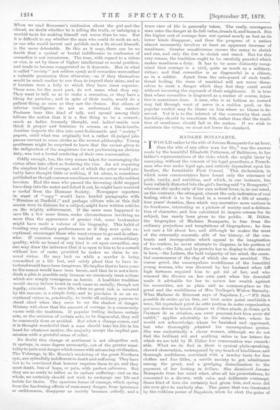THE SOCIAL TREATMENT OF COWARDICE.
COURAGE is a virtue which will grow of itself, or at least people in this country seem to think so. Other virtues are protected by a carefully maintained tradition, and. by care- fully enforced social penalties. Society may wink at certain offences against its law, but at least it is thought necessary to wink. Nor is this a small matter. So long as the tradition is kept up that certain things must not be done openly, so long social influence is against them. But it is not thought neces- sary to enforce courage by the means which we use in regard of truth-speaking, personal cleanliness, and. other qualities which we desire our neighbours to possess. Our soldiers are expected. to be brave in battle, and the current creed holds that they always have been so, and always will be. Let us hope that we may not prove mistaken in this belief; but a man's conduct under exceptional circumstances, commonly depends upon his every-day practice. A particular virtue will only continue to be national so long as the national tradition is in its favour, and strong displeasure is habitually shown by the peers of a man who offends against it. Courage as a civil virtue is feebly enforced among us ; and some of our ways of speaking and acting tend directly to encourage cowardice. Only the other day, a paragraph appearedin the newspapers headed, "An Inhuman Fellow." A man is said. to have left a child to drown, because "he was going a long way, and did not want to get his foot wet." The extreme cynicism of the reason given for passing by on the other side may have been partly assumed, though if it was, the case is not much mended.
When we read Rousseau's confession about the girl and the riband, we doubt whether he is telling the truth, or indulging a morbid taste for making himself out worse than he was. But it- is difficult to say whether the man who could do such au act; or one-who would invent and publish such a lie about himself, is the more detestable. Be this as it may, there can be no doubt that a cynical or brutal indifference to confession of cowardice is not uncommon. The tone, with regard to a virtue or vice, is set by those of higher intellectual or social position, and tends to become exaggerated as it descends. Men in what is called " society " not seldom speak as if cowardice were rather a valeable possession than otherwise,—as if they themsehres would be much readier to run than to imperil their skins, and as if heroism were a folly to which they have risen superior. These men, for the most part, do not mean what they say. They want to talk so as to make a sensation, or they have a liking for paradox ; and in spite of their words, would do a gallant thing, as soon as they saw the chance. But others of inferior iutelligence do not so understand the matter. Footmen hear this kind of talk, and spread among their fellows the notion that it is a fine thing to be a coward ; much as ladies formerly thought, and. ladies'-maids now think it proper and feminine to scream at a black-beetle. Jenkins imports the idea into semi-fashionable and "society" papers, until what was originally but a rather ill-judged joke passes current in some circles as the newest philosophy. Youug gentlemen might be surprised to learn that the excuse given to the indignation of the magistrate for not performing an obvious duty, was but a brutal rendering of their own conversation.
Oddly enough, too, the very means taken for encouraging the virtue often take effect as fostering the vice. An act requiring the simplest kind of courage, and of which the actor would pro- bably have thought little or nothing, if let alone, is sometimes published as though common manliness were as rare as the noblest heroism, Had the man who passed the drowning child stepped knee-deep into the water and fished it out, he might have received a' medal from the Humane Society. Newspaper reporters in want of " copy " would have headed paragraphs with "Heroism at Darfield ;" and perhaps editors who at this dull season were in distress for a subject, might have written articles on the mighty achievement. If the same man happened to save life a few more times, under circumstances involving no more than the appearance of greater risk, some bookmaker might have made a volume of his biography. This habit of treating very ordinary performances as if they were quite ex- ceptional, encourages those who want excuses to go and do other- wise. If common courage is marked as an extraordinary quality, while no brand of any kind is set upon cowardice, any one may draw the inference that it is open to him to be a coward without loss of caste, provided he makes no claim to un- usual virtue. He may look on while a murder is being committed or a life lost, and safely plead that to have in- terfered:would have been dangerous. He implies that to have come to the rescue would have been heroic, and that he is not a hero. Such a plea is possible only because we commonly treat actions which are simply courageous as heroic. A healthier tradition would stamp failure to act in such eases as socially, though not legally,, criminal. To save life, when no great risk is incurred by the rescuer, is a simple duty, and to proclaim it as an ex- ceptional virtue is, practically, to invite all ordinary persons to stand aloof when they seem to see the shadow of danger. History will show that the amount of courage in a community varies-with the tradition. If popular feeling declares certain acts, or the omission of certain acts, to be disgraceful, they will be commonly done or avoided. But when a change comes, and it is thought wonderful that a man should take his life in his hand for whatever motive, the majority accept the implied per- mission with a grateful sense of relief.
No doubt this change of sentiment is not altogether evil. It springs, in some degree necessarily, out of the greater sensi- bility to pain and danger which conies with advancing civilisation. The Volaungs, in Mr. Morris's rendering of the great Northern epic, are splendidly indifferent to death and suffering. They have but to be convinced that honour requires them to go, and they meet death, loss of hope, or pain, with perfect calmness. But they are as ready to inflict as to endure suffering ; and on the whole, we certainly should not wish to exchange our life and habits for theirs. The spurious forms of courage, which spring from the hardening effects of customary danger, from ignorance or recklessness, disappear as society becomes orderly, and a truer view of life is generally taken. The really, courageous man rates the danger at its full value, dreads it, antiques it. But the higher sort of courage does not spread nearly as fast as its lower kinds disappear, and thus the progress of a nation almost necessarily involves at least an apparent decrease of manliness. Greater sensitiveness causes the many to shrink and run, and only the few to shrink and stand, But for this very reason, the tradition ought to be carefully guarded which makes manliness a duty. It has to be more distinctly recog- nised that courage is a civil, quite as much as a military, virtue ; and that cowardice is as disgraceful in a citizen, as in a soldier. Apart from the safe-guard of such tradi- tional feeling, the mass of mankind will not nerve them- selves to meet a danger which they feel they could avoid without incurring the reproach of their neighbours. It is true that where cowardice is disgraced as a matter of course, injus- tice is sometimes done. A man, who is at bottom no coward may fail through want of nerve in a sudden peril, or the popular verdict may fix blame on him whore no blame is de- served. Yet it is to the interest of the community that such hardships should be sometimes felt, rather than that the tradi- tion of manliness should fail in the nation. If we wish to maintain the virtue, we must not lower the standard,



































 Previous page
Previous page